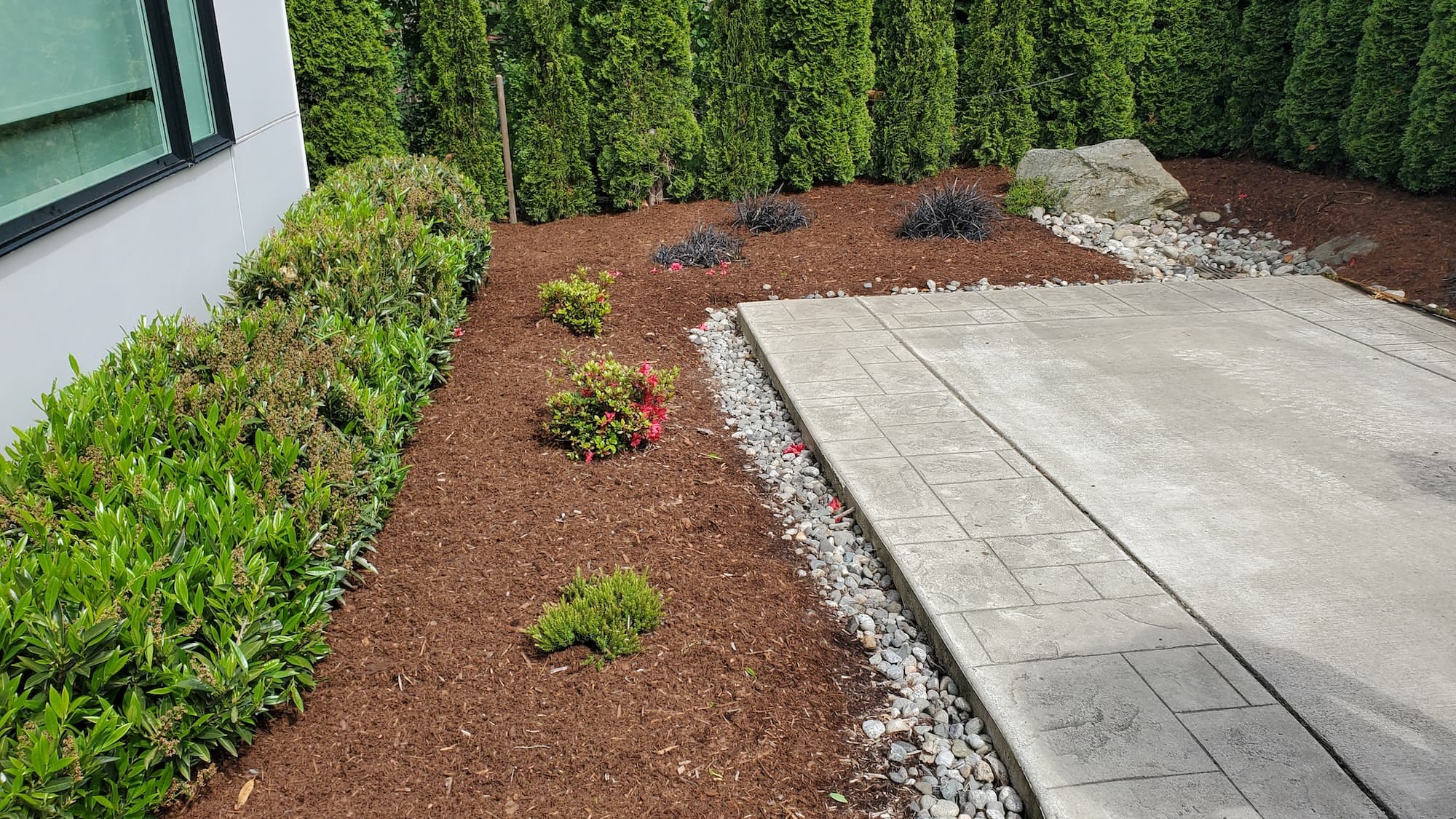West Seattle Remove compacted mulch
Homeowner’s Issue
West Seattle yards get hammered by our climate: frequent rain, winter storms, and stretch of cloudy, cool summers. That steady moisture and the heavy, clay-lean soils in many Admiral and Alaska Junction lots cause shredded bark and wood chip mulch to mat and compress into a dense layer. Compacted mulch sits on top of soil like a roof — shedding water, holding it where it shouldn’t, and creating a perched moisture zone that suffocates roots and invites moss, slugs, and persistent weeds.
Slopes and terraces common above Lincoln Park and along Fauntleroy hill make compaction worse — mulch moves downhill, piles up in hollows, and seals soil underfoot. South- and west-facing microclimates near Alki get more sun, drying the surface but still trapping moisture below the crust, which can stress shrubs and young trees. HOAs on some streets insist on tidy beds, but a neat surface of old compacted mulch can actually hide poor drainage or failing soil structure.
Removing compacted mulch isn’t just cosmetic. It restores water infiltration, reduces slip hazards on pathways, and lets you choose a sustainable re-mulching approach that cuts maintenance. We favor organic fixes — compost, coarse mulch, and mechanical aeration — so beds recover and stay resilient through Seattle’s wet season without herbicides.
Our Quality Service
We remove compacted mulch, assess soil, and install a sustainable replacement tailored to the bed’s exposure and slope. Typical jobs on a standard West Seattle front yard take half a day to a day; larger or steep properties may need a full day plus a follow-up tidy.
Tools and methods: hand rakes, shovels, wheelbarrows, mechanical aerators for large beds, compost spreaders, and biodegradable fabric where erosion control is required. We do all work mechanically and by hand — no herbicides ever. If hauling is needed we sort for green-bin where accepted or haul to proper composting facilities.
Local insight: we size mulch to slope and sun exposure (coarser bark on slopes, finer compost near plant crowns), and recommend timing removal in late spring or early fall to avoid root shock. Benefits include better drainage, longer mulch life, safer walkways, and lower ongoing maintenance.
What’s Included
- Onsite assessment and photo notes of existing mulch, soil, and plant health.
- Removal and sorting of compacted mulch.
- Hand or machine aeration of underlying soil where appropriate.
- Addition of organic compost or soil amendment (as needed).
- Installation of new organic mulch — depth and type matched to plants and slope.
- Cleanup and site sweep; optional haul-away of excess material.
Options / upgrades:
- Mulch + fabric for high-erosion slopes (biodegradable options only).
- Organic weed control: manual removal and mulching to suppress regrowth.
- Soil amendment packages: compost, leaf mold, or finished topsoil.
- Haul-away vs. green-bin sorting (we’ll use Seattle Public Utilities green-bin when eligible).
Before & After / Expectations
Expect noise from hand tools and occasional mechanical aerators; there will be a short-term mess of leaf and bark debris until we haul or compost it. Access to beds should be clear of cars and valuables; narrow driveways can add time and require extra labor.
Timelines: small beds (under 500 sq ft) — half day. Typical front yards — 4–8 hours. Large or steep jobs — full day plus possible return visit. We’ll protect trunks and crowns during work.
Care tips for West Seattle:
- Water newly exposed roots lightly in dry spells; heavy watering isn’t needed unless replacing soil.
- Watch for moss and ivy in shady, damp beds — manual removal before re-mulching reduces recurrence.
- Re-mulch annually to prevent compaction; a thinner refresh (1–2 inches) beats deep re-mulching that can compact.
- Avoid piling mulch against stems or trunks; keep a mulch-free collar to prevent rot.
FAQs
Q: How long before I can replant after removing compacted mulch?
A: You can plant the same day in most cases if soil looks healthy. If we add amendments, wait a few days for settling; we’ll advise on a per-site basis.
Q: Do you use herbicides to control weeds beneath mulch?
A: Never — we use manual removal, mulching, and organic soil health methods only.
Q: Will you haul away the old mulch?
A: Yes. We sort for green-bin composting when accepted by Seattle Public Utilities or haul to approved compost facilities if needed. Haul-away is an optional cost item.
Q: Do I need to be home during the service?
A: No — but clear access and a gate code or parking note helps. We’ll send photos before and after.
Q: When’s the best season to remove compacted mulch in West Seattle?
A: Late spring or early fall. Avoid heavy rain windows; we time jobs around weather to minimize compaction and mess.
Call to Action
If your beds near Alki, Lincoln Park, or the Junction look tired and waterlogged, book a sustainable fix. West Seattle homeowners get quick scheduling and realistic timelines from a local crew that knows our slopes and soil. Email neatandtidyseattle@gmail.com for a free estimate and photos-based quote. We’ll show up, sort the problem, and leave your yard safer and easier to maintain — without herbicides.










